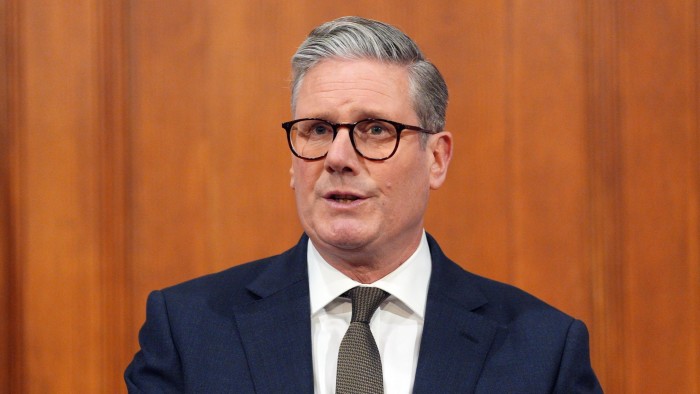Unlock the Editor’s Digest for free
Roula Khalaf, Editor of the FT, selects her favourite stories in this weekly newsletter.
Sir Keir Starmer publicly confirmed that he had changed his position on the definition of a woman on Tuesday, a week after the UK’s Supreme Court ruled that women were defined by biological sex under equalities law.
Downing Street said on Tuesday that the prime minister no longer held the view that he had voiced in 2022 that “trans women are women”, but declined to say when exactly he had changed his mind.
Starmer has shifted his position several times on the issue. However, on Tuesday the prime minister said that a woman “is an adult female” and that last week’s Supreme Court ruling had provided “much-needed clarity” over the issue.
The Equality and Human Rights Commission is drawing up guidance for businesses and public bodies on the implications of the ruling.
Equalities minister Bridget Phillipson also said on Tuesday she would end the practice of mixed-sex hospital wards “once and for all”, accusing the Conservatives of having pledged to end the practice but failing to do so over successive years.
Pressed on whether this meant that trans women would be required to access health and care in men’s settings, she said “the basis for NHS provision and single-sex services of all kinds will be on the basis of biological sex”.
Phillipson said spaces that operated in single-sex settings would be obliged do so on the basis of biological sex, but that providers would have the option of offering inclusive services if they chose to do so.
Earlier on Tuesday, Starmer told ITV that “a woman is an adult female, and the court has made that absolutely clear.”
In his first public remarks since the ruling, he said he welcomed the decision of the Supreme Court, “which has given us clarity, much-needed clarity, and I think for those that are now drawing up guidance, it’s a much clearer position”.
The prime minister’s position appears to have evolved over successive years.
In 2021 he criticised comments by then-Labour MP Rosie Duffield — who had said that only women could have a cervix — as “something that shouldn’t be said” and was “wrong”.
Duffield quit the party over the matter.
In 2022, he cited the Equalities Act when he said: “A woman is a female adult and, in addition to that, trans women are women, and that is not just my view . . . that is actually the law.”
In April 2023, Starmer suggested a woman could have a penis in some instances, telling the Sunday Times: “For 99.9 per cent of women, it is completely biological . . . and, of course, they haven’t got a penis.”
However, last year Starmer adapted his position again. He said he now believed that trans women did not have a right to use women-only spaces, adding: “I’ve always said biological women’s spaces need to be protected”.
The Supreme Court found in a unanimous decision last week that the meaning of “woman” in anti-discrimination law did not extend to a trans woman with a gender recognition certificate.
It ruled that biological sex — the sex with which a person was born — should be used to determine who is able to access single-sex spaces, including toilets and changing rooms. It found that organisations with single-sex spaces could remove transgender people if it were deemed “proportionate”.
On Tuesday in parliament, several Labour and Liberal Democrat MPs warned that the ruling could subject trans women to abuse and violence in male settings, and could also mean that trans men had to use women-only services.
After the ruling, the chair of the EHRC Baroness Falkner said the commission would create a new statutory code of practice by the summer, setting out how public bodies should change their policies in response to the ruling.







